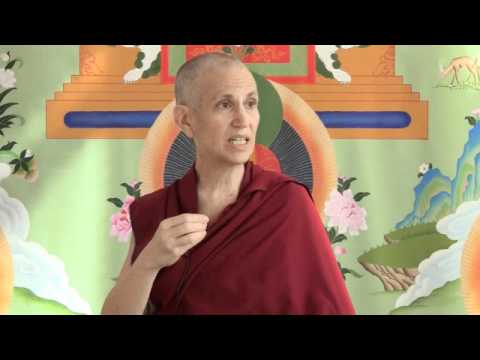Dedication and karma
This talk was given during the White Tara Winter Retreat at Sravasti Abbey.
- Reasons for dedication
- Whether merit gets destroyed by anger
- The way to dedicate
- Different kinds of dedication verses
White Tara Retreat 41: Dedication and karma (download)
We’ll continue on about dedication. Last time I was saying that we dedicate the merit so that it doesn’t get disturbed by anger or wrong views. When we study about karma we learn that karma will definitely produce its result. It doesn’t just get lost somewhere. But it can be hampered from producing its result. In the case of bad karma, if we do purification, then we impede the negative karma from ripening. In the case of virtuous karma, if we get angry or if we generate wrong views, then that impedes that karma from ripening. You can kind of feel it, you know? Like when you get really angry, then afterwards does your mind just feel like, blech? Yes, it does, doesn’t it? And it does feel like you’ve lost everything good inside, in a way.
Or, if our mind gets really overpowered by wrong views, and we’re thinking, “Oh, there’s no such thing as karma and its effects,” or, “Sentient beings are inherently selfish, so impossible to become enlightened,” and, “There’s no rebirth whatsoever, I’m completely convinced of it.” These kind of wrong views are also what will impede the ripening of our good karma. One of the reasons we dedicate is to prevent that.
Contradictory statements
Now, I’ve also run into contradictory statements about this. Whenever they teach about dedication, the masters always say you dedicate the merit so it doesn’t get destroyed. But then, when you study Bodhicaryavatara (Shantideva’s text), chapter six, when you get into the math of merit and what is destroyed at what time, there they say that anger can destroy your merit even if it has been dedicated. So I haven’t resolved this issue yet. My personal tendency is I like to believe if you dedicate it, it won’t get destroyed. But I can’t say that my motivation for believing that is completely pure. [laughter] Definitely some self-interest in there.
But it does make sense to me that if you do dedicate it, even if you get angry maybe not as much will get destroyed, or that somehow dedicating does protect it. Dedicating also does make it last so if you dedicate for full enlightenment it does make it last until that full enlightenment is attained. In that way it won’t get used up beforehand. So dedicating still has benefit. But I’d like to think that, it feels like it should also create some kind of barrier against anger and wrong views. Maybe not a totally impermeable barrier, you know, so that the merit can still be destroyed. So that’s why it’s important to dedicate the merit, and important to do whatever we can not to get angry and not to generate really stubborn wrong views,because those do create a problem in our practice.
The best way to dedicate
Like I was saying last time, the best way to dedicate is for the enlightenment of ourselves and others because that will include all of the good results that can come about while we’re still in samsara. Also, to dedicate with the awareness that ourselves as the one who is dedicating, the action of dedicating, the object of dedication—that all these are empty of true existence and arise dependently.
Dedication verses
Lastly, just to point out that there are many different kinds of dedication verses. Some of them are in the Pearl of Wisdom book. Very often at the end of the text, if you study a text, the author will have some dedication verses. Even in the prayers that we say before meals there’s a dedication verse. For example, the second to the last verse, you know, [paraphrased] “May I never be separated from spiritual mentors in all of my lifetimes and always have the opportunity to make offerings to them.” That is a dedication for offering our food. The verses that we do at the end of the meal is a dedication also. That dedication is for all sentient beings, and in particular, the people who offered the food, as well as all of those who honor us and those who ridicule us. Everybody.
Venerable Thubten Chodron
Venerable Chodron emphasizes the practical application of Buddha’s teachings in our daily lives and is especially skilled at explaining them in ways easily understood and practiced by Westerners. She is well known for her warm, humorous, and lucid teachings. She was ordained as a Buddhist nun in 1977 by Kyabje Ling Rinpoche in Dharamsala, India, and in 1986 she received bhikshuni (full) ordination in Taiwan. Read her full bio.


